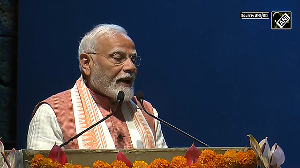Exporters believe the situation will also have a grave outcome for employment, with large numbers of casual laborers looking at no work, as well as downstream units facing a loss of work, reports Subhayan Chakraborty.

After a rebound in October, exporters say demonetisation is likely to lead to a fall in exports this month, with a greater fall in the coming months.
At a meeting with a receptive Nirmala Sitharaman, commerce and industry minister, exporters warned that the ban on Rs 500 and Rs 1,000 currency notes would lead to production falling in the short term. They have also asked that the weekly withdrawal ceiling of Rs 50,000 allowed to industrial units be raised to Rs 500,000.
Sitharaman said a report based on these requests would go to the finance ministry. There had been severe difficulty in the past weeks in sourcing of inputs, paying informal workers and transporting goods, exporters said. A continuation of this would lead to ripple effects for at least some months.
Exports had risen for a consecutive month in October, growing 9.6 per cent to $23.5 billion. This was only the second such occasion in the 22 months since December 2014 when a chronic fall in exports had started.
Exporters believe the situation will also have a grave outcome for employment, with large numbers of casual laborers looking at no work, as well as downstream units facing a loss of work.
“Some of them have preferred closing the units for a week and some of them have been reducing the capacities of production from 100 or 70 per cent to 35-40 per cent,” Sitharaman stated.
The sourcing of scrap metals has effectively stopped, since it is almost always done in cash, the Engineering Export Promotion Council said. Similarly, the garment manufacturing sector is facing difficulty in purchasing of cotton yarn, since farmers only accept cash payments.
Logistics have been another problem area, with truckers particularly hit by the cash crunch. Without the indispensable cash for food, fuel and lodging, many have stopped operations, leading to a massive backlog of consignments to be transported.
The note ban has also thrown up other issues. “Some firms have a weekly system of wages, where workers seek payment in cash. Though they have bank accounts, they are unwilling to accept direct payment to their banks, largely because if the amount exceeds Rs 50,000, this would lead them to forfeit their subsidy benefits for the BPL account,” said Ravi Sehgal, senior vice-chairman, EEPC.
Exporters have asked for a lower charge on credit transactions and concessions to cash-based firms such as handlooms and carpet weaving.
Photograph: Bob Riha, Jr/Reuters.












 © 2025
© 2025